Syria’s new rebel leaders have control of the country. Now what?
The new Islamist-led government promises moderation, but officials aren’t committing to issues such as women’s rights or free elections.
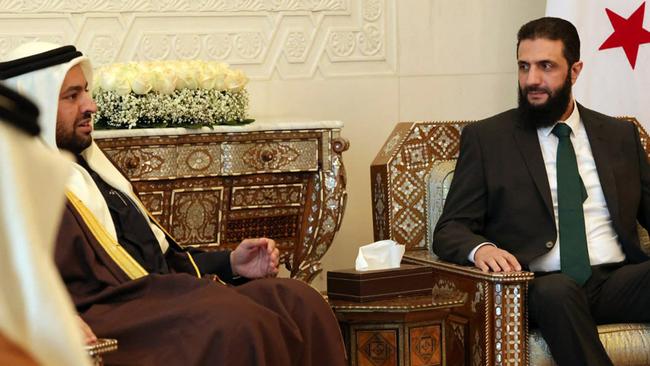
Victorious Islamist rebel leader Ahmed al-Sharaa spends his days conferring with advisers and meeting a stream of visitors — US diplomats and leaders from Turkey, Jordan, Qatar and Syria’s religious sects.
They all want to know the same thing: How does Sharaa plan to govern the war-battered nation of 23 million people?
Sharaa, a guerrilla fighter who led the campaign that toppled the regime of Bashar al-Assad, is seeking an answer. So far, the US-designated terrorist has shed the nomme de guerre Abu Mohammed al-Jawlani, which drew the world’s attention, and swapped combat fatigues for a suit.
Sharaa fought with al Qaeda in Iraq as an anti-US jihadist and, in recent years, has sought to recast himself as a more moderate figure, promoting a pragmatic brand of Islamist politics. He now counsels patience.
“People have big ambitions, but today we must think realistically,” he told reporters after the rebels’ swift victory. “Syria has many problems, and they won’t be solved with a magic wand.”
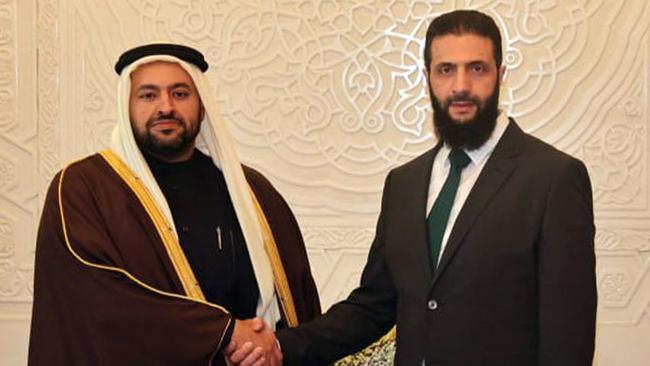
Sharaa’s rebel group, which had for years been running a tiny swath of northwest Syria, now controls cosmopolitan Damascus and rules over millions of Syrians including Alawites, Christians and Kurds. In Aleppo, the first city claimed in the recent offensive, the group left churches untouched and promised to govern inclusively.
Sharaa, leaders of his Hayat Tahrir al-Sham, HTS, as well as allied resistance groups, face decisions that open the door to peaceful rebuilding after more than a decade of civil war or new rounds of sectarian fighting fuelled by the meddling of outside powers.
The rebel leader’s immediate challenge is maintaining order and government services. His group, HTS, had essentially administered a single city in a rebel-held enclave of five million people. To govern the whole country is a tall order. Around 25,000 fighters are spread across Syria’s largest cities, and civilian authorities also are stretched thin.
HTS political affairs bureau member Mohamed Khaled described in a briefing with reporters the group’s to-do list: Merge rebel groups into a national army, bring back Syrian refugees, write a constitution and staff government ministries.
Khaled said he and Sharaa envision a year-long transition to lay the framework for a new government. Such hot-button social issues as women’s dress codes, the treatment of LGBT people and alcohol consumption will be discussed, they said, and elections will have to wait.
More broadly, Syria’s course will shape the influence of Russia, which has military bases in the country that serve as its foothold in the Middle East, and Iran, which sent militia forces to back the Assad regime and has long used Syria as an arena to exercise regional power.
US-backed Kurdish-led militias still control about a third of Syrian territory in the northeast, but they are under increasing pressure from Turkey, which is largely aligned with the new Islamist-led government in Damascus.
In the south, Israel sent troops into a buffer zone near the Golan Heights and seized high ground that commands the approach to Damascus. Sharaa has sought to avoid friction with Israel, even after Israel’s heavy air strikes.
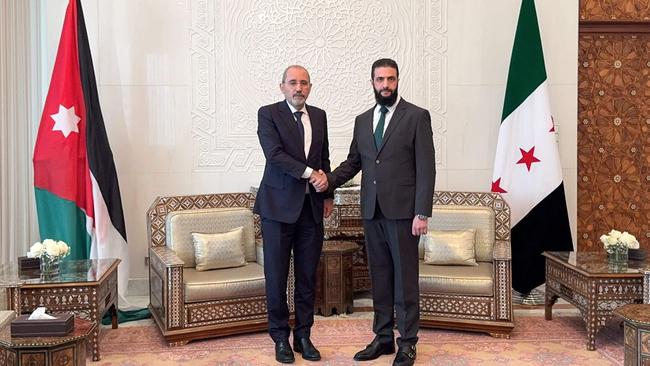
Barbara Leaf, an assistant US Secretary of State who met Sharaa on Friday, said she heard “some very pragmatic and moderate statements on various issues from women’s rights to protection of equal rights for all communities.” “It was a good first meeting,” Leaf said. “We will judge by deeds, not just by words.”
“At the end of the day they’re pragmatic, they’re utilitarian, they’re politicians, they’re incomparable to the regime in terms of their policies,” said Dareen Khalifa, a senior adviser at International Crisis Group who has interviewed Sharaa many times. “But they are conservative Islamists.”
Some Western officials and analysts argue for removal of the group’s US designation as a terrorist organisation. Robert Ford, a former US ambassador who initially pushed to add Sharaa to the terror list, has said they likely no longer qualify.
“Based on what they do now it would be hard to write a justification putting them on the Foreign Terrorist Organisation list,” he said, noting that the group’s fighters fought and died in battle against Islamic State and for years allowed a US-based medical charity to run a hospital in Idlib.
“I don’t think they have a detailed plan yet,” said Ford, the former US ambassador to Syria. “I think, in part, they’re making it up as they go.”
Sharaa’s background
Sharaa, who was born in 1982 in Saudi Arabia, grew up in Damascus. He spent five years in a US prison camp in Iraq after rising through the ranks of al Qaeda in Iraq at a time when the militant group launched attacks on US forces and Shiite civilians.
In 2011, Abu Bakr al-Baghdadi, the leader of al Qaeda in Iraq, dispatched Sharaa to Syria to form a local group after the revolt against Assad started. Sharaa’s nomme de guerre, Jawlani, which means someone from the Golan, refers to his family’s roots in the Golan Heights. His grandfather was displaced during Israel’s capture of the territory in the 1967 Six-Day War.
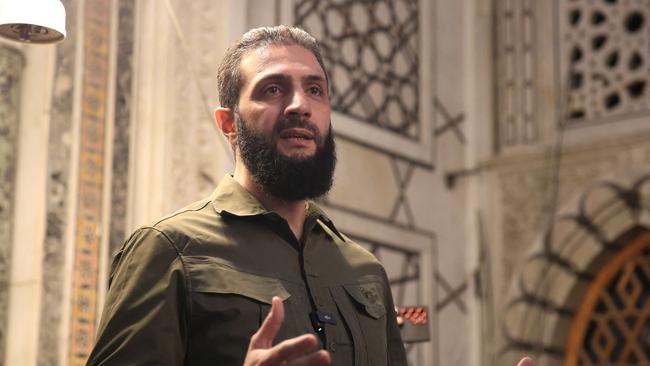
Sharaa grew popular with military successes against the Assad regime and social services provided by his group, according to Aaron Zelin, a security analyst at the Washington Institute for Near Eastern Affairs, and his book on HTS.
Baghdadi grew to distrust Sharaa, who refused orders to wipe out opposition activists and rival rebel groups.
When Baghdadi declared the creation of Islamic State in 2013, Sharaa split off and renewed his allegiance to al Qaeda. He was guaranteed autonomy by al Qaeda leader Ayman Al-Zawahari. Sharaa later described it as a marriage of convenience.
Sharaa severed ties with al Qaeda in 2016 and set out to unify with other rebel groups. He set aside the transnational jihad advocated by al Qaeda and Islamic State and said his goal was to overthrow the Assad regime, rid Syria of Russian and Iranian influence and allow the return of displaced Syrians.
During the decade of war that followed Syria’s 2011 revolution, the Assad regime backed by Russian air power and Iranian-allied fighters pushed HTS and other rebels into a mountainous enclave of northwestern Syria centred on the city of Idlib.
Idlib was known as one of the country’s most conservative cities before the war and swelled with an influx of an estimated two million people displaced by war from other parts of Syria. The city became a rebel-run statelet governed by Islamic law. Nearly all women wore headscarves, and HTS allowed no opposition to its rule.
The rebel group set up an Islamist-led government with courts and a school system in Idlib, launched a campaign to stamp out Islamic State and opened the region to foreign NGOs. For years, HTS has tried to distance itself from its former allies in the world of violent extremism and banned attacks abroad.
Sharaa and his lieutenants, now in charge, say they need to respect Syria’s diversity.
“People have different cultures,” Khaled, the political affairs bureau official, said last week. At the same time, he said, “Syria’s identity is Syrian, and most of its population is Muslim.”
No elections
After Assad fled Damascus on Dec. 8, Sharaa and HTS moved much of its administration from Idlib. “I have brought with me full institutions,” including armed forces, ministers and blueprints for an education system, “Sharaa told reporters.
Police cars bearing the logo of the Islamist-led Salvation Government rolled in after Assad’s security services fled. HTS fighters in combat gear, their assault rifles slung over their shoulders, took control of the presidential palace and military and intelligence buildings.
“The main goal is security, in order to allow the formation of the new government and the police,” said Abu Redaa Khaled, a 21-year-old member of the rebels’ special forces as he walked through the Umayyad Mosque in Damascus.
The new government has reopened schools and returned civil servants to work. It controls state television and the state-controlled news agency. Though the new leaders dismantled the regime’s military and security services, HTS officials said, they decided to preserve many state institutions.
“We didn’t have a choice,” Khaled said. “They understand the secrets of the state.” When HTS formed a new government, the group moved in the prime minister from its Idlib-based Salvation Government.
Western officials broadly agree that Syria’s new leaders have shown a command of technocratic details to manage such national responsibilities as power generation and currency reserves. One European diplomat, who spoke with Sharaa this month, said he expects mistakes from the new government. The question for the West, the diplomat said, is which mistakes to tolerate.
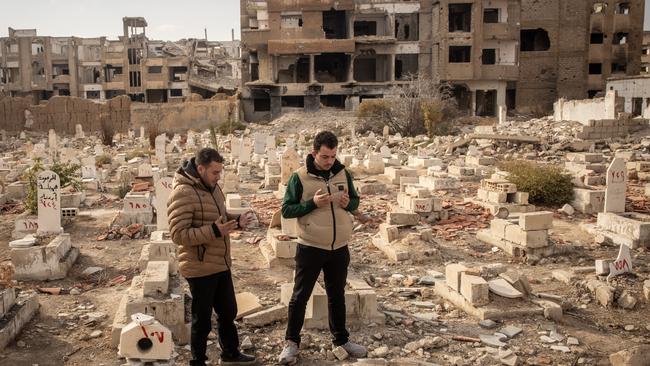
Many Syrians in exile have said they plan to return home, including those who hope to start businesses, charities or media enterprises. Many in Damascus said they were indifferent to HTS but were enjoying their new freedom of expression.
The Assad regime had long closed the white-stone esplanade of the eighth-century Umayyad Mosque, which stands in central Damascus. It has been a source of national pride for Syrians, a tourist destination before the civil war and an emotional symbol for millions of Muslims worldwide.
In mid-December, the rebels opened the esplanade, and throngs of people filed into the complex. Many waved newly sewn green-white-and-black flags of the Syrian revolution, which had been banned under the Assad regime. In the plaza, rebel fighters and residents alike posed for photos.
“Now I can do something to help the country. Before, I couldn’t,” said Zoya Abdullah, a 22-year-old economics student at Damascus University. “We feel more relaxed now.”
THE WALL STREET JOURNAL



